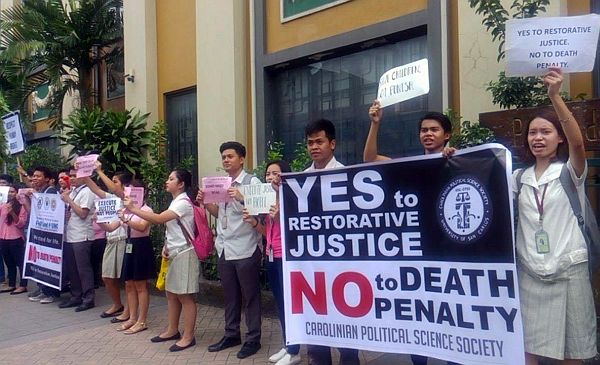
Students of the University of San Carlos – Main Campus join a school-wide noise barrage on Thursday to make their voices heard in the fight against the death penalty and extrajudicial killings.
(CDN PHOTO/Michelle Joy L. Padayhag)
THEY pounded on drums and urged passing motorists to honk their horns.
“Busina, busina, para sa hustisya!” they yelled in protest, hoping to catch everyone’s attention or anyone who cared to listen.
Others brought signs which read, “No to death penalty.”
They were students and faculty of Cebu’s University of San Carlos (USC) — arguably the oldest university in the country.
Run by the Society of the Divine Word, the Catholic institution began to make its presence felt, on Thursday, in the fight against the death penalty and its pesky brother — extrajudicial killings (EJK).
USC students and faculty left their classrooms to be in the streets and on the sidewalk with their drums and posters.
There weren’t too many, but organizers said that every little voice added to the fight counts.
The noise barrage, which began at 12 noon and ended nearly an hour later, was held in the school’s five campuses across Cebu City: USC-Main at the downtown area, USC-Talamban, USC-South Campus at P. del Rosario Extension, USC-North Campus along General Maxilom Ave. and USC Montessori Academy along Don Filemon Sotto Drive.
Fr. Anthony Salas, the school’s vice president for academic affairs, said that they want Congress and the Senate to know that they are standing up against “measures that rush and truncate democratic processes.”
“The University of San Carlos appreciates the Filipino people’s desire for meaningful and decisive change. However, measures that rush and truncate democratic processes essentially deny people the participation demanded by their dignity,” said the USC official statement read by Fr. Salas before a group of reporters.
“If public policy process is to achieve the common good, it must acknowledge that respect for the dignity of every human being is not a concession but a right,” the statement further read.
Along with the reimposition of the death penalty and the spate of EJKs in the country, the school also opposes government plans to lower the age of criminal liability from the current 15 years old to nine years old.
Fr. Salas explained that the school-wide noise barrage was not a compulsory event for students and faculty as the administration respected the rights of those who did not agree with the school’s official stand on current issues.
The school, however, took the time to express their gratitude to Rep. Raul del Mar (Cebu City North) for being the lone Cebuano legislator who voted “no” to the death penalty bill, which passed its third and final reading at the House of Representatives last week.
While USC sent Del Mar a letter of thanks, Fr. Salas expressed his dismay at Cebuano congressmen Gerald Anthony “Samsam” Gullas (first district), Wilfredo Caminero (second district), Gwendolyn Garcia (third district), Benhur Salimbangon (fourth district), Ramon Durano VI (fifth district), Jonas Cortes (sixth district), Peter John Calderon (seventh district) and Aileen Radaza of Lapu-Lapu City’s lone district who all voted yes to the controversial bill.
“We are consoled that 54 members of the House of Representatives voted against the proposed Death Penalty Bill. However, this is our signal to remain steadfast in pursuing just and ethical policies to address the pressing problems of our time,” the USC statement read.
The university continued to hope that the proposed law will not pass the Senate as Senator Francis “Kiko” Pangilinan, Minority Leader Franklin Drilon, Senator Benigno Paolo “Bam” Aquino IV and Senator Leila de Lima have repeatedly stated their opposition to the death penalty bill.
On March 7, the Lower House overwhelmingly voted 216–54 with one abstention, for the revival of death penalty in the Philippines.